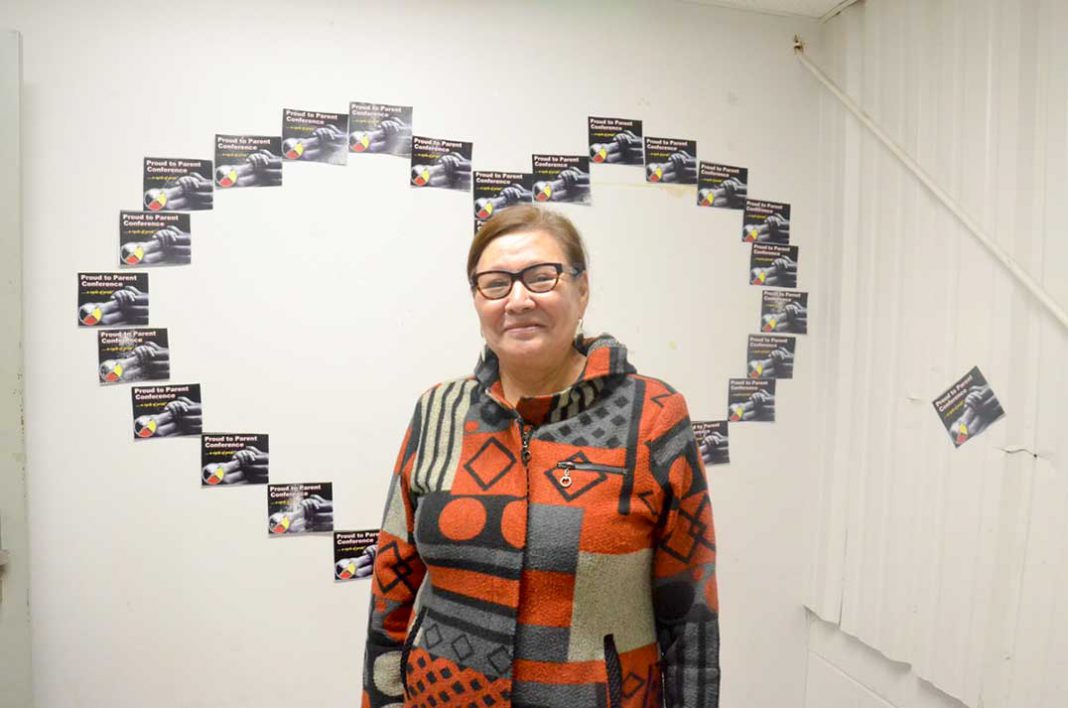WIIKWEMKOONG—A recent two-day Proud to Parent conference was hosted at the Wiikwemkoong arena by Naadwe-chige Wikwemikong Health Centre Children’s Services Program and brought parents together with leading parenting counsellors to share best practices in building healthy family units based on traditional values.
Over the two-day conference keynote speaker Janet Fox discussed topics of Traditional Family Parenting/Reclaiming our Indigenousness.
Ms. Fox hails originally from Red Deer, Alberta and is a member of the Samson Cree First Nation.
“Every First Nation is facing the same cycles of poverty, diabetes, suicide, addictions, high dropout rates, high incarceration rates, gangs, violence and high numbers of children in the child welfare system,” said Ms. Fox. “We can start promoting the pride and rich traditions to the youth in our communities by sharing the teachings, our languages, customs and traditions so that they have a brighter future. The teachings have always been there and they can be revitalized.”
“On the first day I dealt with how our parenting skills were impacted by four generations of residential school,” she said. “Each child was removed from their parents’ care and placed in a very authoritarian system. Ms. Fox pointed out the residential schools, operated by staunch Christians, tended to follow a very Victorian and industrialized school of thought when it came to raising children—and any hint of Indigenous culture was forbidden and severely punished.
“I was forbidden to know my language,” said Ms. Fox. “I was taught to be ashamed of who I am. The textbooks I saw, especially in high school, painted the Anishinaabe as savages and heathens.”
It wasn’t until she reached her 40s that she started to really understand the effects of residential schools and the trauma that they inflicted on generations of her people.
“So we are working through these cycles,” she said. “Due to the policies of assimilation we have to fight to find our roots.”
On the second day of her talks, Ms. Fox explored the teachings that predated the residential schools. “The teachings that were there,” she said. “We need to understand where our ancestors came from.”
Among the topics Ms. Fox explored were the various traditional medicines that Indigenous mothers and grandmothers utilized as part of their childrearing.
Other topics discussed at the conference included ‘Co-parenting, the Good the Bad and the Ugly’ presented by registered aboriginal midwife Sylvia Recollect from the Oneida Nation and Nadmadwin Mental Health Services counsellor Cody Wassengeso; ‘Breast feeding and Post Partum Depression, ‘Looking at the Evidence,’ presented by Stephanie George; ‘Understanding Temperament in the Family’ presented by a child and parent group facilitator at Merrymount Family Support and Crisis Centre in London, Sarah Wells; and finally ‘Anishnabe Men’s Roles and Responsibilities’ presented by Dan Garcia. Day two’s schedule included ‘Breast Feeding: Our Children Can Help Heal Communities From Intergenerational Trauma,’ presented by Stephanie George; ‘Transitioning Together: The Move to School or Daycare’ presented by Sarah Wells; ‘Mirror Communication,’ by Amy Assinewai; and ‘Reclaiming Our Anishinabe Roots,’ by Dan Garcia.
As part of the handout package for the conference was a Best Start booklet supplied by Kina Gbezhgomi entitled ‘A Child Becomes Strong: Journeying through Each Stage of the Life Cycle.’ The booklet contained a wealth of traditional knowledge about Anishinaabe child rearing practices and cultural learning, as well as great explanations of the various stages of development of children.
“We have had a great response from parents for this booklet,” said Daphene Corbiere, maternal health worker with Kina. “It helps parents who are trying to get back into traditional teachings, getting into culture with your children and understanding how they develop.”
“These teachings awaken the spirit in us and we can balance our emotional, mental, physical and spiritual parts so that we can make change in our communities,” said Ms. Fox, who emphasised that Anishinabe traditional parenting skills can be reclaimed despite generations of residential school trauma and the lateral violence it has engendered.




